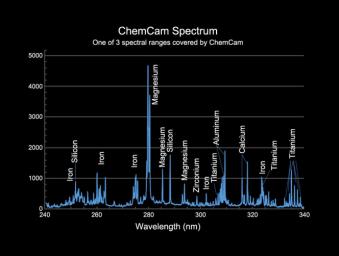
|
Example of a Spectrum from Curiosity’s ChemCam Instrument
- Click the image above for a larger view
- Full-Res JPEG (953 x 720) (59.8 kB)
- Full-Res TIFF (953 x 720) (2.1 MB)
Caption:
This image provides an example of the type of data collected by the Chemistry and Camera (ChemCam) instrument on the Mars Science Laboratory mission's Curiosity rover. The instrument uses a laser to generate a flash of ionized plasma on a target such as a rock, while observing the target with spectrometers receiving light through a telescope. Peaks in the intensity of light emitted at specific wavelengths are indicators of specific chemical elements in the target. The horizontal scale is wavelengths, in nanometers.
Background Info:
ChemCam was conceived, designed and built by a U.S.-French team led by Los Alamos National Laboratory in Los Alamos, N. M.; NASA's Jet Propulsion Laboratory in Pasadena, Calif.; the Centre National d'Études Spatiales (the French government space agency); and the Centre d'Étude Spatiale des Rayonnements at the Observatoire Midi-Pyrénées, Toulouse, France.
JPL, a division of the California Institute of Technology in Pasadena, manages the Mars Science Laboratory mission for the NASA Science Mission Directorate, Washington. This mission will land a rover named Curiosity on Mars in August 2012. Researchers will use the tools on the rover to study whether the landing region has had environmental conditions favorable for supporting microbial life and favorable for preserving clues about whether life existed.
Cataloging Keywords:
| Name | Value | Additional Values |
|---|---|---|
| Target | Mars | |
| System | ||
| Target Type | Planet | |
| Mission | Mars Science Laboratory (MSL) | |
| Instrument Host | Curiosity Rover | |
| Host Type | Rover | |
| Instrument | Chemistry & Camera (ChemCam) | |
| Detector | ||
| Extra Keywords | Color | |
| Acquisition Date | ||
| Release Date | 2011-11-28 | |
| Date in Caption | ||
| Image Credit | NASA/JPL-Caltech/LANL | |
| Source | photojournal.jpl.nasa.gov/catalog/PIA15104 | |
| Identifier | PIA15104 | |
